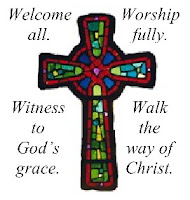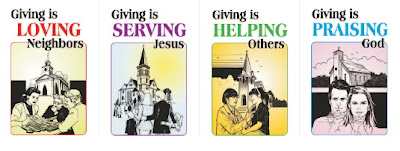 In his famous book, Bowling Alone, author Robert Putnam notes the substantial decline of membership in a whole host of clubs, nonprofit organizations, and civic groups in the last 20 years. As we anticipate the beginning of a new year and our upcoming Annual Meeting on Sunday, January 29, it is worth asking: What does membership at St. Edward's mean? What is expected of us as members, if anything? Even the concept of a volunteer organization such as the church might cause some people to bristle at the notion of any expectations whatsoever. Yet as has been demonstrated repeatedly, a growing church does have expectations of those who choose to be its members. Not surprisingly, I believe that membership expectations at St. Edward's mirror our four-fold mission: Welcome all. Worship fully. Witness to God's grace. Walk the way of Christ. Let me explain.
In his famous book, Bowling Alone, author Robert Putnam notes the substantial decline of membership in a whole host of clubs, nonprofit organizations, and civic groups in the last 20 years. As we anticipate the beginning of a new year and our upcoming Annual Meeting on Sunday, January 29, it is worth asking: What does membership at St. Edward's mean? What is expected of us as members, if anything? Even the concept of a volunteer organization such as the church might cause some people to bristle at the notion of any expectations whatsoever. Yet as has been demonstrated repeatedly, a growing church does have expectations of those who choose to be its members. Not surprisingly, I believe that membership expectations at St. Edward's mirror our four-fold mission: Welcome all. Worship fully. Witness to God's grace. Walk the way of Christ. Let me explain.Welcome all.
Part of who we are as members of St. Edward's includes welcoming each and every person, regardless of their faith journey (or lack thereof), political affiliation, or theological opinion. As such, the first expectation of our members is that they will actively seek out newcomers, welcome them to St. Edward's, and facilitate their participation in our worship service or other event. We are always to be on the lookout for another one of God's guests that passes through our doors.
Worship fully.
While it is probably obvious, one of the basic expectations of a member of St. Edward's is that he or she will attend and actively participate in our worship service each week, unless prevented from doing so by illness or other overriding obligation (work-related travel, etc...). Churches are often criticized with the indictment: "They just want my money!" Well, while we're perfectly happy to receive your financial support (see below), what we most want is your participation, not your pledge.
Witness to God's grace.
If you've ever been to an airport, you've seen the signs that say: "If you see something, say something!" One of the expectations that we have for our members is that they will be sensitive to God's work in the world--directly, through them, and through others--and that they will find ways to say something about what they've seen or experienced in this area. Part of this response is to pledge financial support to St. Edward's as a tangible reminder and indicator that God is working in and through the church to accomplish God's mission on earth. In short, we have to put our money where our mouth is! If we believe that the church is God's instrument for the reconciliation of the world, it follows that it both needs and deserves our support.
Walk the way of Christ.
The early followers of Jesus Christ were simply called "The Way." This was a reflection of Jesus' saying "I am the way, the truth, and the life." (John 14:6, NASB) It was also an indicator that to follow Jesus means to be on a pilgrimage, a spiritual path. As members of St. Edward's, and therefore followers of Jesus, it is expected that our service to God does not end at the church door, but that we "seek and serve Christ in all persons, loving our neighbor as ourselves" (as our Baptismal Covenant says). In practice, what that means is that every member of St. Edward's is expected to identify and participate in both activities that enhance their spiritual lives and service opportunities that help others. As we do this, we are well aware that we will always fall short of what God has in mind for us, yet as St. Paul writes, we "press on toward the goal for the prize of the upward call of God in Christ Jesus." (Philippians 3:14, NASB)
Hopefully the above gives you some encouragement, perhaps some challenge, and perhaps a new resolve to make your membership in St. Edward's even more meaningful in 2012. See you Sunday!

